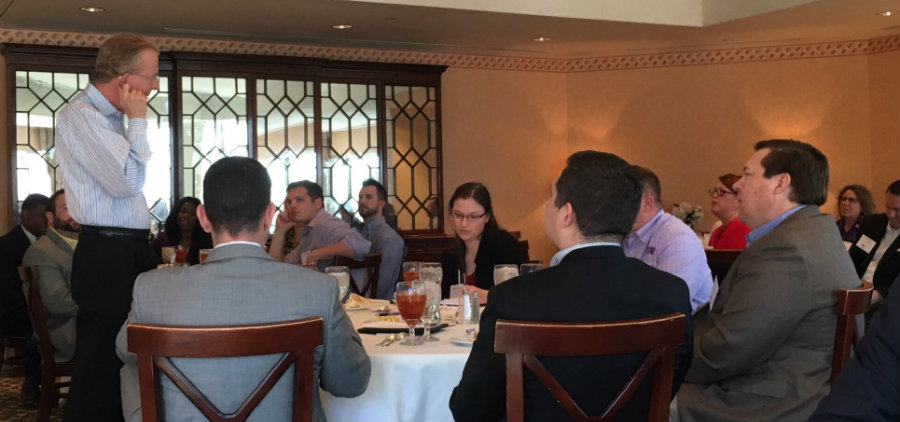“Business law” may bring to mind droning suits and textbooks the size of Volkswagens, but it’s far from boring when Dr. Robert Rhodes, Professor of Professional Practice in Business Law, is teaching.
At the recent Neeley Executive MBA Preview Luncheon, 29 prospective students, current students and alumni were just getting drowsy after a hearty lunch provided by the City Club of Fort Worth, when Dr. Rhodes stood to speak and woke us all up.
March 29, 2017
“Business law” may bring to mind droning suits and textbooks the size of Volkswagens, but it’s far from boring when Dr. Robert Rhodes, Professor of Professional Practice in Business Law, is teaching.
At the recent Neeley Executive MBA Preview Luncheon, 29 prospective students, current students and alumni were just getting drowsy after a hearty lunch provided by the City Club of Fort Worth, when Dr. Rhodes stood to speak and woke us all up.
He didn’t even need a slide presentation. He had some notes, but he never looked at them. He just talked to us, asked us questions and made us a little bit nervous, but mostly made us laugh – and think.
“The terrifying things about business law are the things you don’t know,” he began. And then proceeded to show us what he meant.

The scenario
Start with an ordinary transaction. You’re the purchasing manager for a major retailer of musical instruments and sound equipment. You have a relationship with a Chinese company that manufactures lower-end drum kits. You renew a $1 million order for these drum kits; the fine print on the back of the purchase order states that any dispute will be heard in California under California contract law.
Three months later, you receive the drum kits and the invoice, whose fine print says all disputes will be heard in Shanghai, under Chinese law.
Soon you discover that several of the drum kits become faulty after being exposed to high temperatures. Half your order is unsellable. But you’ve already paid the invoice. The manufacturer refuses to refund your money, so you file a half-million dollar lawsuit in California.
When contracts conflict, which one wins?
Dr. Rhodes backs us up a little: First we have to determine if a purchase order even counts as a contract.
Short answer: Yes. Conduct counts as an acceptance of the contract. The manufacturer’s action of sending you the drum kits could be construed as acceptance of the contract in the purchase order. Of course, then the manufacturer sent their own version of a contract in the form of an invoice.
Under Article 2-207 in the Uniform Commercial Code (UCC), if the terms of the invoice are inconsistent with the terms of the purchase order, they cancel each other out, because the partners never truly agreed. (If you’re doing a lot of business via purchase orders., Dr. Rhodes advises, be familiar with Article 2-207.)
However, this case wouldn’t be decided under the UCC, but under the Contracts for the International Sale of Goods (CISG), an agreement signed between 85 countries to regulate international sales. Article 19 states, roughly, that an acceptance that differs from the initial offer is not an acceptance, but a counteroffer – and you accepted that counteroffer by paying the invoice.
So you’ll be resolving the dispute in China. Too bad for you.
But let’s say the California judge doesn’t know about CISG – not all of them do, Dr. Rhodes noted. In that case, under the UCC, you might win in California. Congrats!
But how do you enforce the ruling?
If the case were contained in the U.S., the judge would stamp a warrant and police would collect your assets, because Article 4 of the Constitution secures full faith in credit. But we don’t have that agreement with China.
So do you send a letter to the manufacturer? Do you hold off on all future orders?
Maybe you hire a Shanghai lawyer to petition the Chinese court system for enforcement. But the Chinese court system has never in its history enforced a judgment from outside of China.
This started out so innocent, but now with legal fees you’re potentially out three-quarters of a million dollars. You’d have been better off spending a little more time upfront to create an actual contract versus relying on a purchase order, especially for an amount as large as $1 million.
So what’s the solution?
Arbitration in China, as we’ve discussed, will probably not go well.
Here’s another option: arbitration in Hong Kong.
Hong Kong uses common law similar to U.S. law (both have their roots in British law) and China and Hong Kong have agreed to enforce each other’s rulings. This is your best chance for a favorable ruling.
“The world is far more legally complicated than you even realize,” summed up Dr. Rhodes. And as he demonstrated, those complications can cost you if you don’t know how to ask the right questions.
Alumni may not remember every detail of what they learned in his class, but they do remember what questions to ask. One alumni piped up from the back of the room to say that just two hours earlier, he had used what he’d learned in the class to create a contract that would protect his organization from this kind of expensive issue.
--
Find this useful? Join us for the next preview luncheon to enjoy more business insights and meet EMBA alumni, current students, prospective students and faculty.
Answers from real alumni
Every preview luncheon also features an alumni panel Q&A. Check out the panel recap.

